Power and authority in the modern world
1/59
There's no tags or description
Looks like no tags are added yet.
Name | Mastery | Learn | Test | Matching | Spaced |
|---|
No study sessions yet.
60 Terms
Which article of the treaty of versailies meant germany had to accept full guilt for WW1
article 231
How much money did the TOV state germany had to pay in reparations
Approx 6.6B great british pounds
What territorial concessions had to be made from the TOV
loss of alsace-lorriane, it was given back to the French
what limitations were placed on the german military via the TOV
Germany was only allowed to have 100,000 soldiers, no tanks and no airforces, and were only prohibited to have 6 battleship
What were the conditions of the Treaty of saint-germain (austria)
Austria was required to give up land, and dissolved the Hasburg empire. Furthermore, Austria was forbidden from uniting with Germany
What was the impact of the treaty of Saint-Germain
a reshaping of central europe by creating new nations and shrinking Austria’s territory, as well as the forced inclusion of large-german speaking populations under foreign rule, causing instability, and also Austria had to accept guilt for the war
Treaty of Neuilly-Sur-Seine
Required bulgaria to give up land to greece, and it’s army was limited to just 20,000 soldiers, and also required to play 100 million pounds in reparations, but this was reduced and later cancellled
Treaty of trianon (hungary)
signed in june 1920, and lost 70% of their pre-war territory, and their army was limited to 35,000 soldiers, and limitations also placed on weaponry that could be used
Treaty of Sevres
signed august 10 1920, and officially broke up the ottoman empire, by ceeding territory to greece, but the treaty was annuled in november of 1933, and replaced with the treaty of Lausanne
liberal democracy
A form of democratic government where liberal freedoms (ex: freedom of the press and religion) are protected
authoritarian
favouring strict obedience to authority: a term normally associated with dictatorships, where the authority of the govenrment is not to be questioned
Role of Benito Mussolini in establishing a fascist regime in italy
Mussolini established fascist party in 1919, and gained full power adter the march of rome
Conditions that gave rise to an italian dictatorship
economic and social instability, even before the war, and after the war, there were 2mill unemployed, along with a significant decline in the country’s GDP
living conditions under the fascist dictatorship in Italy
Strong penal code, a secret police and prohibition of all oppression, along with censorship
Conditions leading to a dictatorship in Japan
Japan was on the allied side during ww1, and gained some of Gemrany’s colonial possessions, but was overall dissatisfied with it’s outcomes. Additionally, Japan suffered greatly during the great depression, and as a result people started looking to extremist political regimes
Role of general Tojo in creating the japanese dictatorship
General Tojo rose in the army quickly, during a period of tension between the army and the governent, and quickly became a symbol of the highly militaristic nationalism movement
The manchurian crisis
in 1931, following the explosion of a japanese railroad from Manchuria to Muckden, Japan use this explosion as a way to control the region, and colonise china
ideology of the italian facist regime
Emphasis on national rebirth, and anti-communist and ant-liberal policies, instead incorprating corpratist polices, as well as territorial expansionism
ideology of the japanese dictatorship
as opposed to Russia, Japan was more influence by conservative ideas. Additionally, the emperor of japan was at the heart of the ideology, and irrational fanaticisim was encouraged
Freikorps
German right wing millitia units largely composed of veterans
Volksgemeinschaft
german people’s community: the racially pure German state imagined by the Nazi party
article 48
enabled the president to rule by decree and implement laws without the support of the Reichstag
Volkisch
nationalist, racialist and populist political and cultural movements prevalent in germany from the late 19th century
Lebensraum
the idea of the acquisition of land for german hegemony in eastern europe
Ebert-Groener Pact
signed 10th November 1918 in an effort to prevent a communist revolution
Weaknesses of the Weimar: proportional representation
meant that parties obtained Reichstag seats in direct proportion to the votes - led to no party having an overall majority and making it difficult for laws to be passed - weak and unstable coalitions
Role of Gustaf Streissman
Weimar politician and chancelleor of gemrany, and was crucial in securing the Dawes plan. The chancellor from august to nov of 1923, and ended hyperinflation
Dawes plan
American loans to germany, and a scaling-back of the money Germany owed in reparations
What happened in september of 1926
Germany became a full member of the united nations
what was the impact of the Great depression on the Weimar republic
The Dawes plan collapsed, and the ‘golden years’ of Weimar ended as well
Beerhall Putsch
a failed 1923 coup by Hitler and the Nazi party in an attempt to overthrow the Weimar republic
Fuherprinzip
Meaning leader, and Hitler determined himself as this
Role of the great depression in Hitler’s rise to power
The great depression ends the stability of the golden years, and people become polarised towards extremist political parties, and Hitler’s promises give people hope for stability
when did Hitler join the german workers / nazi party
joined in 1920, and quickly became a key figure
What was the percentage of votes gained by the Nazi part in 1932
37% of the votes went to the Nazi party in 1932, and won the largest amount of seats in the Reichstag
when did Hitler become appointed chancellor
30th January 1933
Reichstat fire
In 1933, the house of parliament burnt down, and Hitler used this to spread fear of a communist uprising in Germany
What were some key moves made by Hitler in 1933
He abolishes freedom of the press, and the first anti-Jewish laws are passed, and he disbands all other political parties
What happened on the 30th of june 1934
the night of long knives, where leaders of the SA paramilitary branch of the Nazi party were arrested on Hitler’s orders
what happened on august 2nd 1934
President Hinderberg dies, and Hitler then declares himself the ‘Fuher” (supreme leader)
How was racial superiority included in Nazi ideology
there was a racial hierachy, for example slavic people were low and French people were high. However jewish people were seen as an anti-race, and were seen as dangerous creatures in seemingly human forms
Volkisch
The idea that all German people belonged to one group
What was the 25 point programme
The Nazi party platform, delivered by Hitler at a Nazi meeting
point 8 of the 25 point programme
Any further immigration of non-citizens prohibited
point 4 of the 25 point programme
only a member of the Aryan race can be a citizen
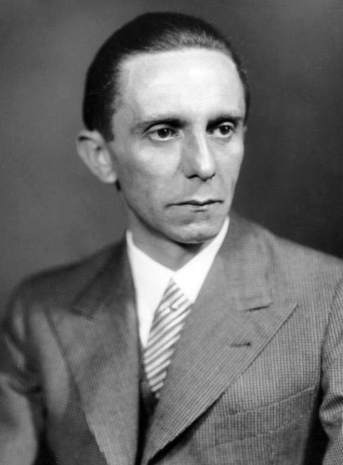
Who is this
Joseph Gobbels
what was Joseph Gobbels role in the Nazi party
Minister of propoganda and public enlightenment, and ran a newspaper discussing anticommunism, antisemitism and Hitler’s dictatorship
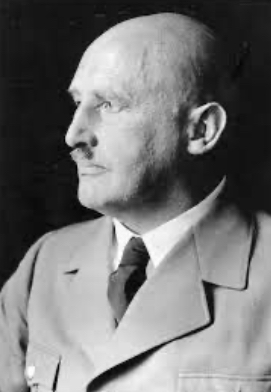
Who is this
Julius Streicher
what role did Julius Streicher play in the Nazi party
Established the anti-semetic newspaper “Der Sturmer” and also took part in Hitler’s Putsch. However, Streicher was eventually removed from the party due to individuals complaining about his psychotic behaviour and sexual charges against him.
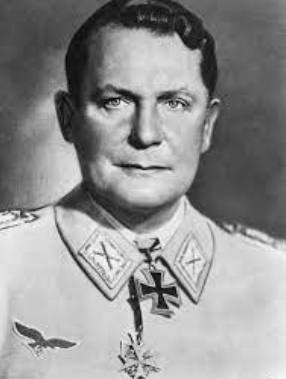
Who is this
Hermann Goring
what was Hermann Goring’s role in the Nazi Party
Leader of the Nazi paramillitary group involved in the beer hall Putsch, (the SA), and created the first concentration camps
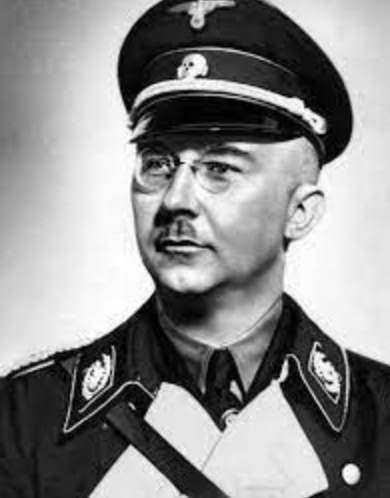
who is this
Henrich Himmler
what was Heinrich Himmler’s role in the Nazi party
Leader of the SS from 1929-1945, commander of the bavarian political police and created the first concentration camp at Dachau
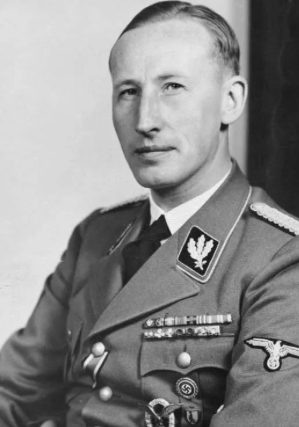
Who is this
Reinhard Heydrich
what was Reinahrd Heydrich’s role in the Nazi party
SS general who helped the Nazi party through action such as arresting thousands of Jewish people on Kristallnacht, and head of the Reich security central office. Heydrich was also one of the architects of the final solution.
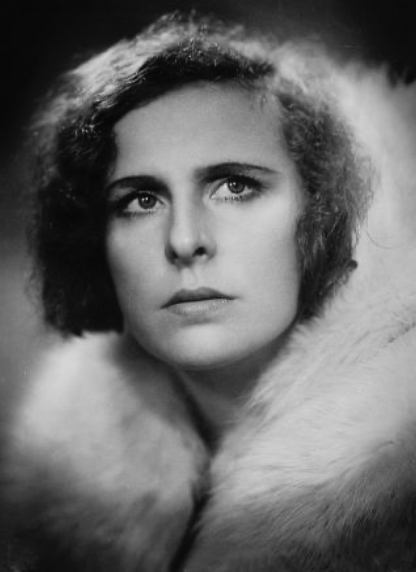
who is this
Leni Riefenstahl
what was Leni Riefenstahl’s role in the Nazi party
Created propoganda films, including ‘triumph of the will’ and ‘olympiade’ and put them within the education situation so that german children could learn about Hitler’s ‘Bravery’ during WW1’
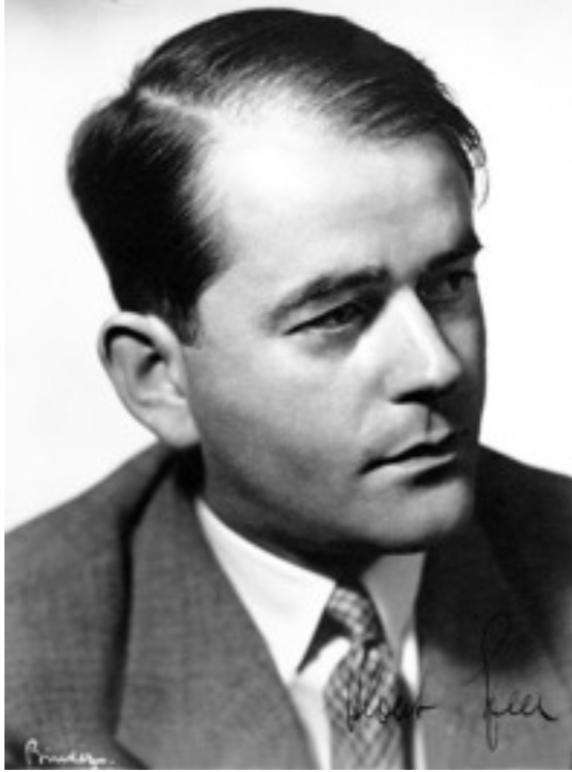
Who is this
Albert Speer
What was Albert Speer’s role in the Nazi party
Personal architect for Hitler, and was named minister of arnaments and munitions in 1942. Additionally, Speer used millions of forced labourers to raise economic production
What was the decree of the protection of the people and the ri